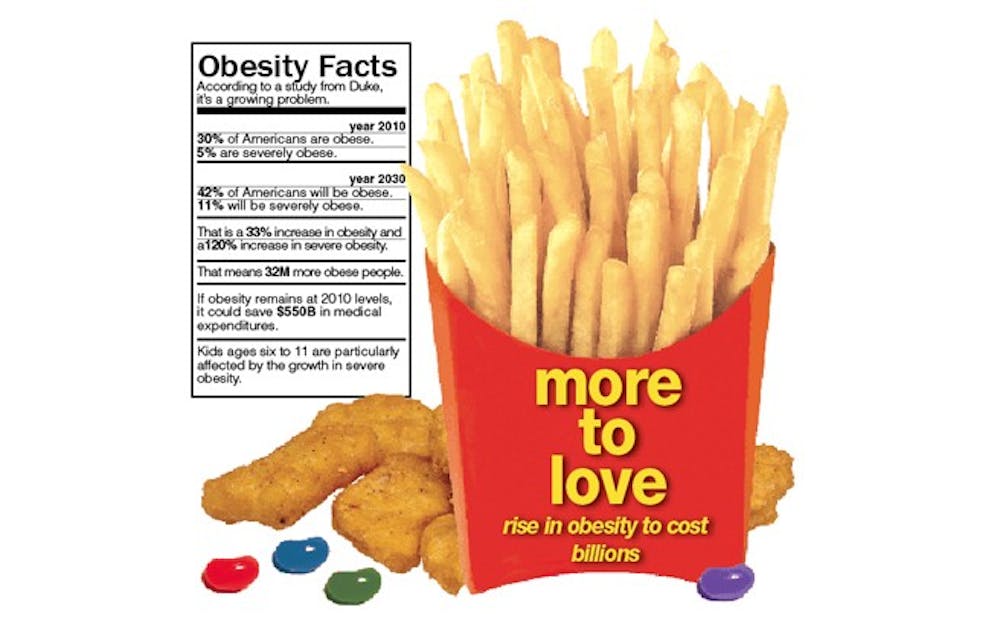Without interventions, 42 percent of the American population will be obese by 2030, a rate that could cost billions in medical expenditures, a recent study predicted.
Led by researchers at the Centers for Disease Control and Prevention and the Duke Global Health Institute, the study determined that previous statistical forecasts that predicted an obesity prevalence of 51 percent by 2030 were too high. The study suggests, rather, that obesity prevalence will increase by 33 percent by 2030, to 42 percent of the population, if interventions are not put in place.
The researchers also predicted severe obesity to expand at a greater rate than previously projected, forecasting that 11 percent of the population will be severely obese by 2030.
“[Although] the [obesity prevalence] numbers are ominous, they were not unexpected,” lead author Eric Finkelstein, associate research professor in the DGHI, wrote in an email Monday. “What did surprise me was the doubling in severe obesity prevalence.... That is a big cause for concern.”
The study used body mass index as an indicator of obesity—with a BMI of 30 or more indicating obesity and a BMI of 40 or more indicating severe obesity.
In order to clarify the additional cost of expanding obesity, the researchers compared projected rates to a 2010 benchmark. The researchers concluded that if obesity rates are kept at 2010 levels, almost $550 billion could be saved in medical expenditures over the next two decades.
“The more obese people, the more it costs to treat their medical conditions,” Finkelstein said. “Another 20 years of 32 million more obese people adds up very quickly.”
Dr. Sarah Armstrong, director of the Duke Children’s Healthy Lifestyles Program, said childhood obesity follows the trend of obesity in general. Whereas the rate of childhood obesity has plateaued, more kids aged six to 11 are becoming severely obese. She noted the effects of obesogenic environments, which promote weight gain.
“People may not have a local grocery store or transportation to a place that allows them to be physically active, [so] environmental factors are more important than the personal decisions made on a daily basis,” Armstrong said.
Because medical issues that arise as a result of obesity—including cardiovascular disease—are all problems that begin in childhood, more efforts should be geared toward childhood obesity prevention, Armstrong said.
“Autopsies performed on children as young as 14 show those with a higher BMI tend to have more fat in their blood vessels,” she said. “Since heart disease is the most expensive ticket item for us in terms of overall health, anything we can do as a culture to prevent kids from getting obese would be the best cost-saving strategy for the future.”
Finkelstein similarly noted that a focus on kids and schools is the best hope for fighting the obesity epidemic.
The authors presented this study at the CDC’s Weight of the Nation conference May 7-9. At the conference, the Institute of Medicine of the National Academies published a list of recommendations to help fight the obesity epidemic: to integrate physical activity into daily routines, market healthy living, make healthy foods and beverages more widely available, activate employers and health care professionals and strengthen the role of schools in promoting health.
Kelli Friedman, a psychiatrist with the Duke Center for Metabolic and Weight Loss Surgery, stressed the importance of giving support to patients trying to lose weight. People battling with clinical depression as a result of their obesity need to be treated for their psychological issues first and foremost.
“We have to think about the psychology of obesity—not only as depression being a cause of weight gain, but also as the effect of a society that so stigmatizes weight,” she said. “We need to give more support for patients who are trying to lose weight.”
Get The Chronicle straight to your inbox
Signup for our weekly newsletter. Cancel at any time.

